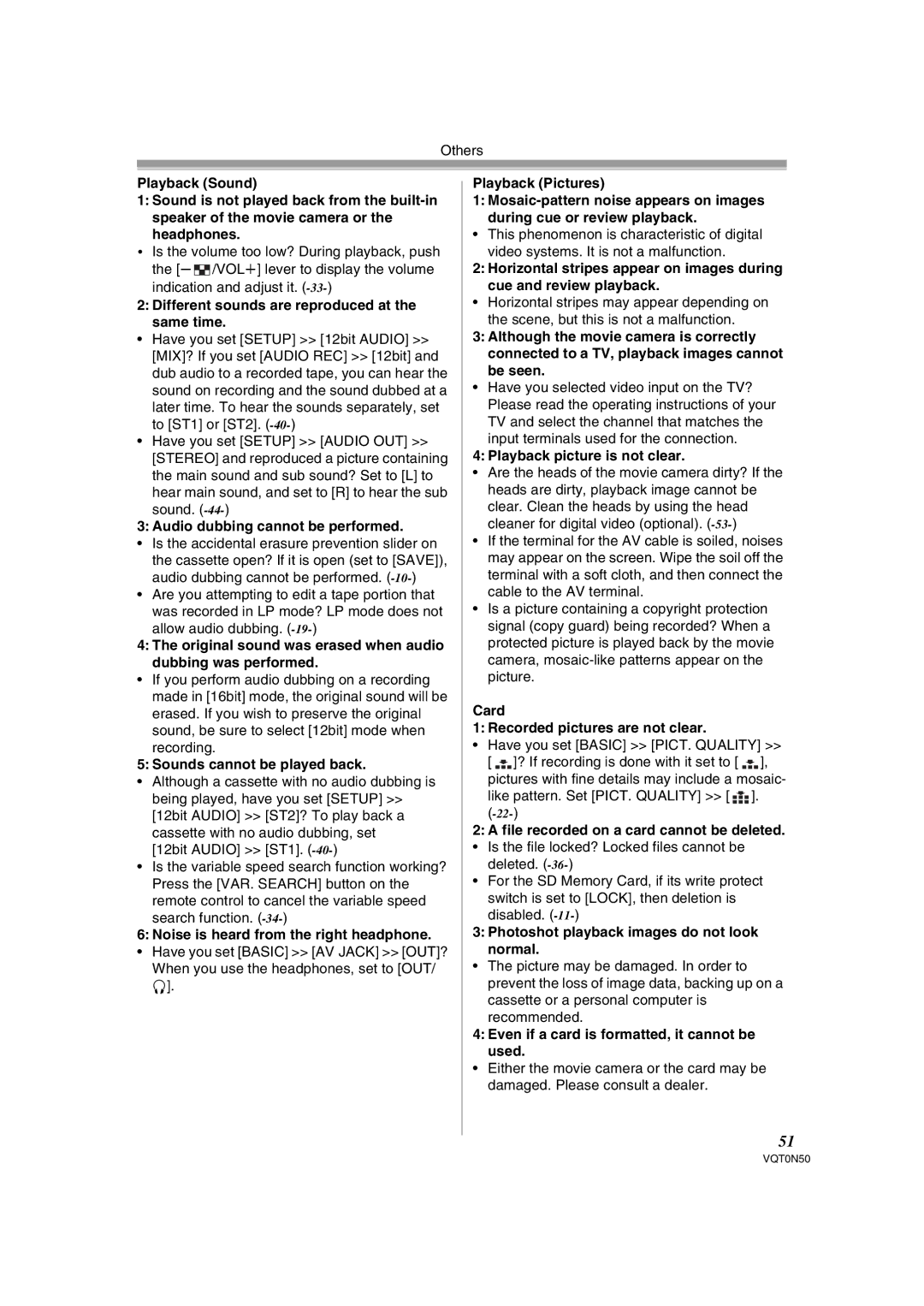
Others
Playback (Sound)
1: Sound is not played back from the
0Is the volume too low? During playback, push the [s![]() /VOLr] lever to display the volume
/VOLr] lever to display the volume
indication and adjust it.
2:Different sounds are reproduced at the same time.
•Have you set [SETUP] >> [12bit AUDIO] >> [MIX]? If you set [AUDIO REC] >> [12bit] and dub audio to a recorded tape, you can hear the sound on recording and the sound dubbed at a later time. To hear the sounds separately, set to [ST1] or [ST2].
•Have you set [SETUP] >> [AUDIO OUT] >> [STEREO] and reproduced a picture containing the main sound and sub sound? Set to [L] to hear main sound, and set to [R] to hear the sub
sound.
3: Audio dubbing cannot be performed.
•Is the accidental erasure prevention slider on the cassette open? If it is open (set to [SAVE]), audio dubbing cannot be performed.
•Are you attempting to edit a tape portion that was recorded in LP mode? LP mode does not
allow audio dubbing.
4:The original sound was erased when audio dubbing was performed.
•If you perform audio dubbing on a recording made in [16bit] mode, the original sound will be erased. If you wish to preserve the original
sound, be sure to select [12bit] mode when recording.
5: Sounds cannot be played back.
•Although a cassette with no audio dubbing is being played, have you set [SETUP] >> [12bit AUDIO] >> [ST2]? To play back a cassette with no audio dubbing, set
[12bit AUDIO] >> [ST1].
•Is the variable speed search function working? Press the [VAR. SEARCH] button on the remote control to cancel the variable speed
search function.
6: Noise is heard from the right headphone.
•Have you set [BASIC] >> [AV JACK] >> [OUT]? When you use the headphones, set to [OUT/ Ë].
Playback (Pictures)
1:
•This phenomenon is characteristic of digital video systems. It is not a malfunction.
2: Horizontal stripes appear on images during cue and review playback.
• Horizontal stripes may appear depending on the scene, but this is not a malfunction.
3:Although the movie camera is correctly connected to a TV, playback images cannot
be seen.
•Have you selected video input on the TV? Please read the operating instructions of your TV and select the channel that matches the
input terminals used for the connection.
4: Playback picture is not clear.
•Are the heads of the movie camera dirty? If the heads are dirty, playback image cannot be clear. Clean the heads by using the head cleaner for digital video (optional).
•If the terminal for the AV cable is soiled, noises may appear on the screen. Wipe the soil off the terminal with a soft cloth, and then connect the cable to the AV terminal.
•Is a picture containing a copyright protection signal (copy guard) being recorded? When a protected picture is played back by the movie camera,
Card
1: Recorded pictures are not clear.
•Have you set [BASIC] >> [PICT. QUALITY] >> [ ![]() ]? If recording is done with it set to [
]? If recording is done with it set to [ ![]() ], pictures with fine details may include a mosaic- like pattern. Set [PICT. QUALITY] >> [
], pictures with fine details may include a mosaic- like pattern. Set [PICT. QUALITY] >> [ ![]()
![]()
![]() ].
].
2:A file recorded on a card cannot be deleted.
• Is the file locked? Locked files cannot be deleted.
• For the SD Memory Card, if its write protect switch is set to [LOCK], then deletion is disabled.
3:Photoshot playback images do not look normal.
•The picture may be damaged. In order to prevent the loss of image data, backing up on a cassette or a personal computer is
recommended.
4:Even if a card is formatted, it cannot be used.
•Either the movie camera or the card may be damaged. Please consult a dealer.
51
VQT0N50
